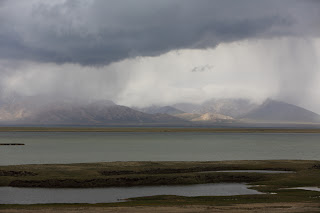Tourugart Pass is regards as one of the most unpredictable border crossing in the world.
Torugart Pass (Chinese: 图噜噶尔特山口; pinyin: túlūgáĕrtèshānkŏu; Kyrgyz:Торугарт) is a pass in the Tian Shan mountain range on the border between the Naryn Province of Kyrgyzstan and the Xinjiang Autonomous Region of China.
Today we crossed into Kyrgyzstan from China. We met with two groups of travelers from Spain and Australia at the Chinese checkpoint and we took this opportunity to promote Georgetown Penang to them.
During the same time, we were interviewed by China national news agency CCTV running a documentary on Chinese border posts. The Torugart border was friendlier than we thought. We have no issue at all with both the Chinese nor Kyrgyz authority.
Our journey now has reached the halfway mark. As we crossed from China to Kyrgyzstan the road infrastructure became worse and for the most part from the border to Naryn was unpaved national roads.
Our guides for Kyrgyz is a lovely lady Meerim, a Kyrgyz native from capital Biskek whose origins were from lake Issyk Kol. She speaks fluent English and has a bubbly, charming personality.
As we drove along the way, the scenery was truly fantastic and no word can describe how we feel, perhaps a simple ‘ahhhhhhhh’ is best word to describe how we felt.
In addition, the 3750m pass is very cold, with snow and hail showers occasionally.
The semi nomadic lifestyle of the people now has changed. Paid shepherds now took over the traditional shepherds who are now just owners of the herd.
After about 3hours of bad roads, we reached Naryn. The place we are staying is a bed and breakfast and dinner was English and Central Asian.
We took a walk around town but not much to see in this former USSR garrison town, so we went back to our respective yurts and rooms.


























































